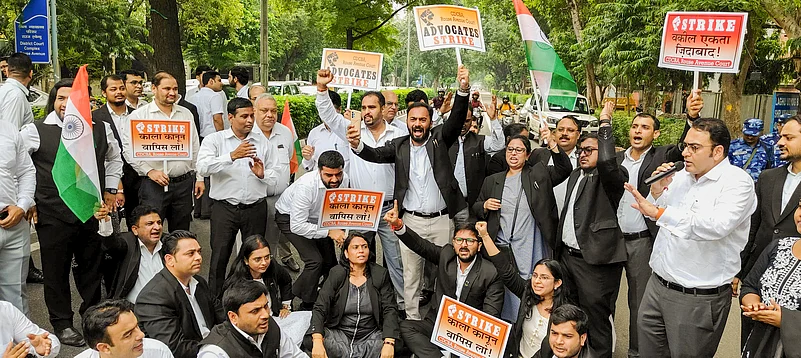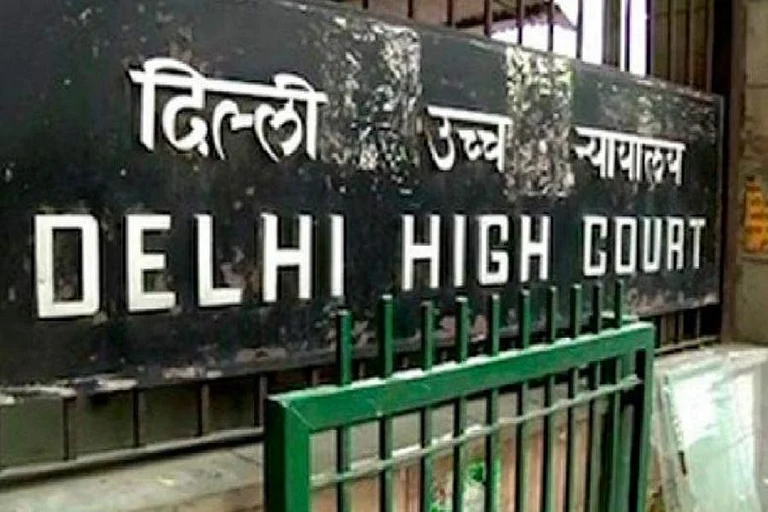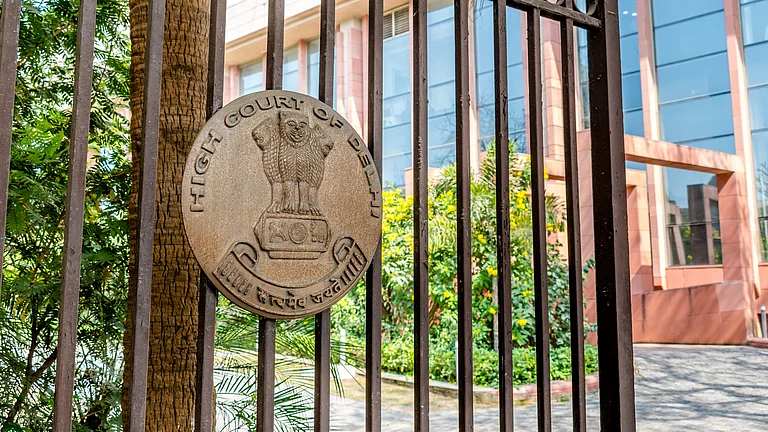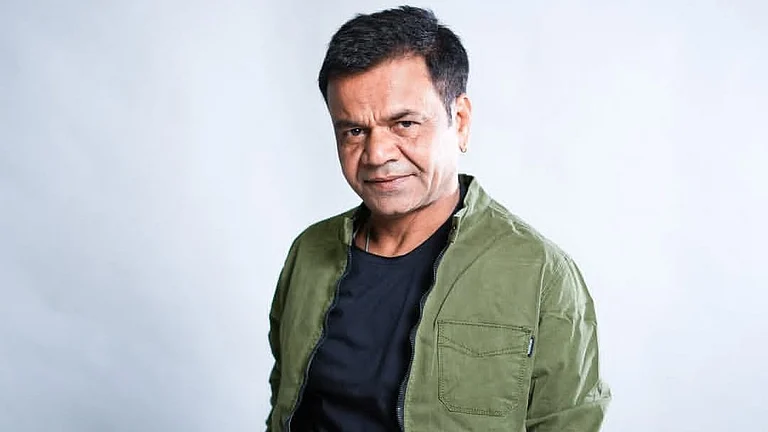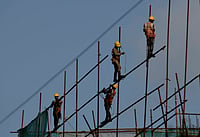
Summary of this article
PIL challenges Delhi LG's order allowing police to testify via video conferencing from police stations.
Lawyers say the move violates fair trial rights and creates unequal treatment under the law.
Delhi Police pauses implementation after widespread protests and pending Home Ministry review.
Delhi Police officials might soon be permitted to testify via video conferencing. The order allowing this, issued by Lt Governor VK Saxena’s office on August 13, has sparked widespread protests from lawyers across the capital. Following the directive, the Delhi High Court has agreed to examine a PIL challenging the move. The plea, filed by advocate Kapil Madan, questions the legality of the notification under the Constitution.
“Orders like these might usher in an era where we turn ourselves into a police state—where police possess unimaginable powers,” Madan told Outlook. His petition argues that the order undermines the constitutional guarantee of a fair trial under Article 21. According to Madan, the cause of witnesses and complainants in criminal cases is best served when the investigation agency appears in court in person. “When police officers give evidence from their own premises, there are very high chances of tutoring. There could be manipulations,” he warns.
The matter was mentioned before the bench of Chief Justice of Delhi High Court DK Upadhyay and Justice Tushar Rao Gedela last week, which said it would be listed for Wednesday. The petition specifically contests the decision to designate all 226 police stations in Delhi as venues for police officers to depose from.
According to the directive, officers, including investigating officers who are in charge of cases on behalf of the State, and witnesses in criminal cases, need not be physically present in court for providing evidence or deposition.
Officers will no longer have to travel to physically attend court proceedings. The argument is that this will save time and resources for the deposing officers.
The [purported] reform has been presented in the draft model rules on video conferencing (nyaya shruti) under the Bharatiya Nagarik Suraksha Sanhita (BNSS), which recently replaced the Criminal Procedure Code evolved in the 1970s.
“In Maneka Gandhi, the Supreme Court observed that administrative procedure must be just, fair and reasonable. If you test this [order] on that yardstick, the answer is no. Even if it takes time, equity is still in favour of a just and fair trial. This violates the prosecution’s fundamental constitutional duty.”
What he means is that while delays have been an often-criticised aspect of the Indian judicial system, the methods to speed up trials ought to be better thought out. Just speed, if it comes at the cost of fairness, would create more problems than solve.
In legal terms, he explains, the term for such a situation is that it creates an “arbitrary classification”, which isn’t reasonably associated with the aim to speed up trials.
“The police officers will be able to depose from the police station, but the defence witnesses will have to go to court to depose. So this setup works for police officers but not witnesses. It violates Article 14 of the Constitution,” Madan said. Article 14 promises equal treatment before the law to every person in India.
Besides, the new notification contradicts Section 308 of the BNSS, 2023, which mandates that evidence must be recorded in the presence of the accused and under the control of the presiding judge. The fundamental legal principle here is nemo judex in causa sua or no one can be a judge in their own case. The reason is simply: if witnesses get to testify from within their own spheres of authority, it creates a perception of bias.
Madan also contends that by unilaterally designating police stations as deposition centres, the Executive has usurped judicial powers, violating Article 50, which mandates the separation of powers.
“What if someone wants to observe the proceedings of a case. Will they be allowed into a police station to do so? We know how police stations function. A lot of intimidation and coercion happens at police premises,” he says, referring to the Indian law that court proceedings are a matter of public record and witness, barring exceptional circumstances.
On August 14, the Delhi High Court Bar Association also strongly condemned the order, and gained support from the Supreme Court Bar Association, which called it a threat to judicial independence. The Coordination Committee of Delhi’s District Court Bar Associations had called for a strike after authorities failed to revoke the notification. Lawyers staged a sit-in protest outside outside all six major Delhi district court complexes (Tis Hazari, Patiala House, Saket, Karkardooma, Rohini, and Dwarka) starting from August 16, 2025 and boycotted proceedings. They say the move will enable manipulation of evidence and undermine fair trial standards.
For now, Delhi Police have paused the implementation of the directive until the Union Home Ministry has heard stakeholders. The Union Home Minister, Amit Shah, is expected to meet representatives of the Bar to discuss the issue “with an open mind” a statement released on August 22 from the office of the Commissioner of Police read. “In the meantime, the operation of the said notification…would only be carried out after hearing all stakeholders,” the statement added.
Following this assurance, the lawyers called off their protest on August 24.
While the legal fraternity has spoken in one voice, there is support for the directive as well. For instance, retired Delhi High Court Justice SN Dhingra defended it, calling it both legal and practical.
“The directive is entirely constitutional. Police officials are already inclined to support their investigation—whether they testify in person or via video conferencing doesn't change that. Courts routinely accept arbitration and evidence via virtual means. Even the High Court often records evidence through a local commissioner. So how is this any different or illegal?” he said.
Dhingra questioned the objections raised on the grounds of ‘fair trial’ as well. “That notion is often vaguely interpreted. Is stalling proceedings through prolonged protests part of fair trial? Judges’ time is frequently wasted in the name of disruptions and no one questions it. The real issue is how long we will continue to resist modern technology in our courts. Its adoption is inevitable,” he said.
A sub-inspector in Delhi Police, requesting anonymity said that the move will have the opposite effect to the lawyers’ claims.
“Digital evidence creates a reliable record that cannot be easily denied or manipulated…. With help of CCTV footage etc., evidence can be verified during proceedings, thereby reducing the chances of bias or unfair practices. Examination through digital mode will… provide the accused and their lawyer a proper opportunity to cross-examine witnesses, while maintaining transparency and saving time,” he said.
But Madan and lawyers on the Bar are not buying it. The video conferencing rules allow the court to appoint any person as coordinator for proceedings. “But who will this coordinator be? Someone from the police, or judicial staff? What happens if the police influence or coerce them?” Madan asks.
With the matter set to be heard on Wednesday, lawyers, witnesses and police stand at a crucial juncture. It is the court that will decide whether digital convenience can coexist with the fundamental right to a fair trial.



